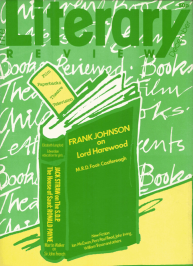Margot Strickland
Spectral Apparel
The Ghost in the Looking Glass
By Christina Walkley
PeterOwen 160pp £12.50
A hundred years ago to be one of a million Englishwomen was to be doomed. Even intelligent and educated girls could not get a post as a governess – there were too many. Hundreds of thousands resorted to plying their needle in the genteel trade of dressmaking for the wealthy middle and upper classes. Ironically the great Victorian families whose hobby was doing good were the best customers, unaware that they were wearing spectral apparel. Tubercle bacillus, cholera, measles and typhus germs were coughed and breathed into the fabric by the girls who stitched themselves to death. More girls blinded themselves sewing black bombazine to be festooned with jet beads, fringing and braid by the mile, in which ladies mourned their dead. The girls were packed into airless rooms beneath gas-lamps each of which took up five times the oxygen one girl needed to stay alive. In their love-starved and stunted lives they became emotionally dependent on the garments they sewed and the fashionable women who would wear them. The excitement of the Season when they worked all night was the nearest they got to fun.
When a twenty-year-old girl employed by the best modiste in London, Madame Elise of Regent Street, (alias Mr & Mrs Isaacson), court dressmaker to the Princess of Wales, was found dead in 1863, one of her friends wrote to the Times. The tragedy no one had noticed was aired and


Sign Up to our newsletter
Receive free articles, highlights from the archive, news, details of prizes, and much more.@Lit_Review
Follow Literary Review on Twitter
Twitter Feed
How to ruin a film - a short guide by @TWHodgkinson:
Thomas W Hodgkinson - There Was No Sorcerer
Thomas W Hodgkinson: There Was No Sorcerer - Box Office Poison: Hollywood’s Story in a Century of Flops by Tim Robey
literaryreview.co.uk
How to ruin a film - a short guide by @TWHodgkinson:
Thomas W Hodgkinson - There Was No Sorcerer
Thomas W Hodgkinson: There Was No Sorcerer - Box Office Poison: Hollywood’s Story in a Century of Flops by Tim Robey
literaryreview.co.uk
Give the gift that lasts all year with a subscription to Literary Review. Save up to 35% on the cover price when you visit us at https://literaryreview.co.uk/subscribe and enter the code 'XMAS24'